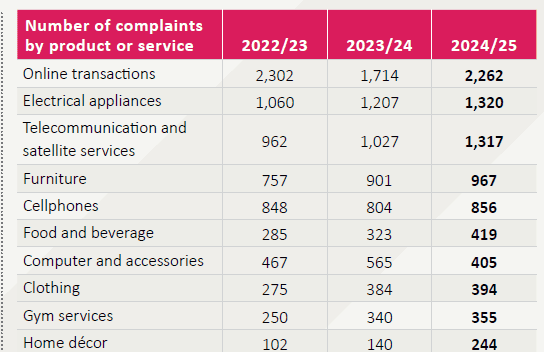Most of the complaints received were about online shopping, followed by complaints about electrical appliances.

The Consumer Goods and Services Ombud managed to get R11.9 million back into consumers’ pockets after resolving their complaints during the past financial year.
According to the annual report of the Consumer Goods and Services Ombud (CGSO) that was released on Thursday, the CGSO responded to 41 855 email, telephone and WhatsApp queries, an average of 158 per day compared to 36 964 in the previous year and received 12 207 complaints.
The CGSO’s office closed 12 430 complaints, referred 1 918 out-of-jurisdiction complaints to other regulators and CGSO offices and settled 62% of complaints received within 60 days, getting back money or facilitating exchanges to the value of R11.9 million.
ALSO READ: As online shopping grows, so do the complaints
What consumers complained about
According to the report, 8 740 (72%) of the 12 207 consumer complaints the CGSO’s office received in the previous financial year were about goods, agreements, services and deliveries. Consumers mostly complained about goods that became defective within six months, late or unreasonable deliveries and punitive cancellation terms, where consumers had to pay a fine to cancel a transaction.
Queen Munyai, CEO of the CGSO’s office, says the Consumer Protection Act (CPA) expressly protects consumers in South Africa against all three of these practices.
“This makes them not so much customer service issues as customer rights issues. We call on all suppliers of goods and services to ensure that they are aware of the provisions of the CPA in this regard.”
Online transactions once again topped the list of the top 10 complaints by sector, accounting for 30% of the 7 486 complaints in the 10 sectors with the most complaints (up from 26% in the previous year).
“Even as a percentage of all complaints received, online transactions are almost twice as likely to be complained as the next sector, electrical appliances and telecommunications and satellite services, to create headaches for consumers.”
This list shows what consumers complained about the most compared to the previous two financial years:

Ombud has favourable outcome for 64% of cases
The CGSO’s office was unable to proceed with 3 295 cases, including 1 918 cases that were referred to other regulators and CGSO offices and 441 that were closed due to a lack of cooperation from the consumer.
In 9 135 of the remaining cases, 64% had a favourable outcome for consumers (up from 60% in 2023/24), with the CGSO finding fully in favour of 37% (3 393) of the cases, while 15% of cases (1 394) were resolved directly between the supplier and the complainant within the first 15 business days. However, 18% of complaints had to be closed due to non-cooperation from suppliers.
ALSO READ: Squeaky mattress and R4 air fryer: Consumer ombud ensures refunds of R12 million
Almost 80% of the complaints were submitted by consumers in the metro areas of Gauteng (48%), the Western Cape (18%) and KwaZulu-Natal (13%), while the other provinces trail far behind.
Munyai says from speaking to consumers on the ground, the two most significant barriers to redress are lack of information and poverty. “People often do not know their rights and even if they do, they do not know who to turn to for help.
“Many consumers also informed us that the high cost of data prevents them from lodging a complaint effectively, as almost all complaints are submitted via our website or the CGSO app.”
She says the partnership with academia is also part of a strategic initiative to enhance awareness of the versatility of alternative dispute resolution processes by contributing to the academic discourse and bridging the gap between theory and practice for law students.
“Alternate dispute resolution as a process is an under-utilised mechanism in South Africa and I would love to see it used more widely to achieve social justice.”
ALSO READ: Consumer Goods and Services Ombud gets R11.5 million back for consumers
Women especially vulnerable
Munyai also points out that women are disproportionately vulnerable as consumers, facing higher rates of poverty, unemployment and food insecurity compared to men. “This vulnerability is further exacerbated by factors like unequal pay, limited access to resources and gender-based violence.
“Women-headed households, particularly those in the rural areas, experience higher poverty rates. They are also more likely to be unemployed or in low-skill, poorly paid jobs. For these women, a purchase that goes wrong can be the difference between putting food on the table and going hungry.
“For this reason, it is important that we find effective ways to reach women so that they are aware of their rights as consumers and the redress available in the event of a dispute with a supplier.”
The CGSO relies exclusively on industry participants to fund its activities and Munyai says none of the work they do would be possible without the buy-in from business. “As a registered not-for-profit organisation, industry participation fees enable us to provide a free, independent and alternative dispute resolution service that benefits everyone.”
ALSO READ: Ombud calls for updates to legislation to protect online consumers
This year the CGSO surpassed the 2 000-participant mark, with 2 175 paid-up participants, representing a 19% year-on-year increase.
How to lodge a complaint at the CGSO
Consumers who want to lodge a complaint can download the CGSO mobile complaints app from the App Store or Google Play. Alternatively, you can call the CGSO on 0860 000 272, send an email to [email protected], or visit the CGSO website at www.cgso.org.za to submit a claim.






